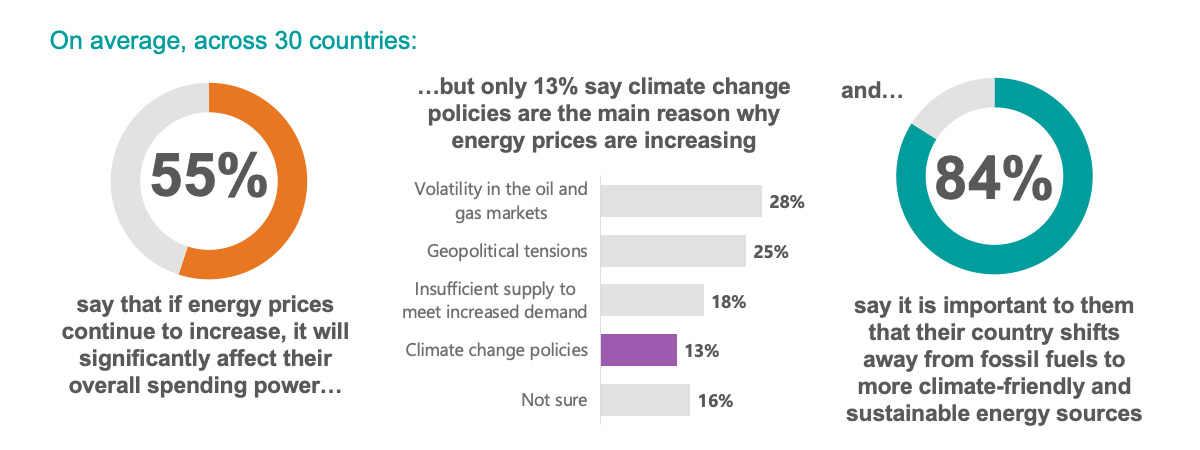Global consumers support shift from fossil fuels as they expect spike in energy prices to reduce their purchasing power
A new global survey conducted by Ipsos for the World Economic Forum finds that, even though most consumers across the world expect their purchasing power to be impacted by rising energy prices, few blame climate change policies for it. The survey finds a consensus in all 30 countries surveyed around the importance of moving away from fossil fuels.

The survey was conducted among 22,534 adults under the age of 75 conducted between February 18 and March 4 on Ipsos’s Global Advisor online survey platform.
Detailed Findings
Impact of energy price hikes on consumers’ spending power
Survey respondents were asked to think of all the energy they use daily for transportation, heating or cooling your home, cooking, powering your appliances, etc., and how much they pay for it and to assess how much energy price increases will affect their overall spending power. While on average 55% say price hikes will have a fair amount or a great deal of impact on their purchasing power, expectations vary widely across countries. More than two-thirds in South Africa, Japan, and Turkey say so vs. just over one-third in Switzerland and the Netherlands.
Globally, the survey finds few differences across demographic groups when it comes to the expectation that one’s overall spending power will be significantly impacted by continued energy price increases. Concern is slightly higher among those with a lower income and those in the 35-49 age group.
No unified views on the cause of energy price increases
Within nearly every country, consumers show a diversity of views on the main reason for energy price hikes. On average globally, about one-quarter (28%) cite volatility in the oil and gas markets and another quarter (25%) cite geopolitical tensions; 18% cite insufficient supply to meet increased demand while only 13% cite climate change policies. With only one exception, no single reason is cited by a majority in any country.
-
Market volatility is most widely seen as the cause of price hikes in Mexico (40%), South Korea (38%), Peru (36%), and Saudi Arabia (36%)
-
Geopolitical tensions are most blamed in the Netherlands (the only country where any single reason is cited by a majority – 54%), Belgium (46%), and Italy (42%).
-
Insufficient supply is most cited in South Africa (37%), Malaysia (28%), and Argentina (28%).
-
Climate change policies are most commonly blamed in India (24%), Germany (20%), and Poland (19%); and among all demographic groups, by business decision-makers (19%). However, it is not the #1 reason in any country or among any demographic group.
Consensus on the importance of shifting away from fossil fuels
On average, more than four in five of those surveyed globally (84%) say it’s important to them that their country shifts away from fossil fuels to more climate-friendly and sustainable energy sources in the next five years. Vast majorities say so in every country: from 72% in Russia and 75% in the United States to 93% in South Africa and Peru. Citizens of emerging countries are especially adamant about it.
Globally, the level of importance granted to shifting away from fossil fuels is very high across all demographic groups. The only difference of note is along gender lines as the percentage viewing the shift from fossil fuels as important is six points higher among women (87%) than among men (81%).
Read the World Economic Forum article
These are the findings of a 30-country Ipsos survey conducted February 18 – March 4, 2022, among 22,534 adults aged 18-74 in the United States, Canada, Ireland (Republic), Malaysia, South Africa, and Turkey, and 16-74 in 24 other countries, via Ipsos’s Global Advisor online survey platform.



